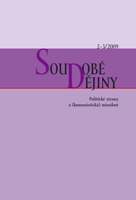Stigma minulosti, pouto sounáležitosti: První desetiletí českého polistopadového komunismu
The Stigma of the Past, Family Ties: The First Ten Years of Czech Communism after the Changes of 1989
Author(s): Michal KopečekSubject(s): History
Published by: AV ČR - Akademie věd České republiky - Ústav pro soudobé dějiny
Summary/Abstract: This article is concerned with the attitude that the Communist Party of Bohemia and Moravia (Komunisticka strana Čech a Moravy – KSČM) has had towards its own past. It examines the subject from the perspective of the internal development of the Party and its search for a political and cultural identity in the Czech political system. The interpretation of the past and the role of the Czechoslovak Communist Party (Komunisticka strana Československa – KSČ) in Czech and Czechoslovak history were key elements in the ideological development of the Party in the first ten years of Czech democracy after the Changes beginning in mid-November 1989. And they played a central role in the Communists’ efforts to respond to the new democracy’s systemic and rhetorical anti-Communism. In this article the author seeks to demonstrate what effect debates about the past had in causing divisions in the Party in the first years after the Changes. On the one hand they contributed to cleavages within the Party, but on the other they also created conditions for its later consolidation and new self-confidence. The initial reformist strategy inclined roughly to the ideas of the Social Democratic Party and sought to win the maximum number of votes and ultimately a share in government. It was supported by the fi lm-maker and chairman of the Party, Jiři Svoboda (born 1945) from 1990 to 1993, but was gradually superseded by the strategy of what one Czech expert on international relations, Vladimir Handl, has called the ‘left-wing retreat’, and what one British political scientist, Sean Hanley, calls ‘voter representation’, based on the strengthening of political-cultural identity and the emphasizing of communication between the rank-and-file and the leadership of the Party. As the author demonstrates, the idea of ‘coming to terms with the past’ gradually acquired a meaning amongst the Communists that was markedly different from the meaning it had for most Czechs. The pragmatism of the subsequent leader, Miroslav Grebeniček (born 1947), to a certain attenuated, but did not solve, the fundamental dilemma faced by the Party, which consisted in the conflict between the ‘logic of the electoral struggle’ and the ‘logic of voter representation’. The first trend after the downfall of the reformists in 1993 included, in particular, neo- Communist theorists (like the political thinker Miloslav Ransdorf, born 1953), who sought to formulate Socialist alternatives acceptable to most left-leaning Czechs. That also led them to attempt a more critical analysis of their own past than the majority of their rank-and-file members would have done.
Journal: Soudobé Dějiny
- Issue Year: XVI/2009
- Issue No: 02-03
- Page Range: 386-418
- Page Count: 33
- Language: Czech

